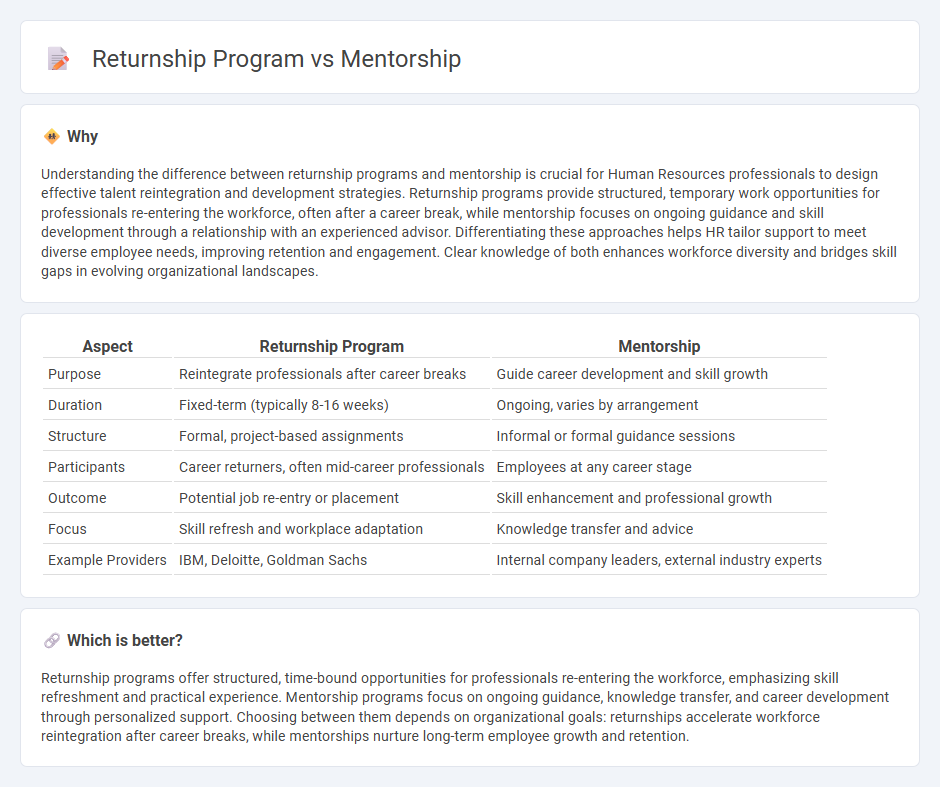
Returnship programs provide structured opportunities for professionals re-entering the workforce after a career break, focusing on upskilling and practical experience. Mentorship programs connect less experienced employees with seasoned professionals to foster knowledge sharing, career development, and skill enhancement. Explore how these initiatives can boost talent retention and employee growth in your organization.
Why it is important
Understanding the difference between returnship programs and mentorship is crucial for Human Resources professionals to design effective talent reintegration and development strategies. Returnship programs provide structured, temporary work opportunities for professionals re-entering the workforce, often after a career break, while mentorship focuses on ongoing guidance and skill development through a relationship with an experienced advisor. Differentiating these approaches helps HR tailor support to meet diverse employee needs, improving retention and engagement. Clear knowledge of both enhances workforce diversity and bridges skill gaps in evolving organizational landscapes.
Comparison Table
| Aspect | Returnship Program | Mentorship |
|---|---|---|
| Purpose | Reintegrate professionals after career breaks | Guide career development and skill growth |
| Duration | Fixed-term (typically 8-16 weeks) | Ongoing, varies by arrangement |
| Structure | Formal, project-based assignments | Informal or formal guidance sessions |
| Participants | Career returners, often mid-career professionals | Employees at any career stage |
| Outcome | Potential job re-entry or placement | Skill enhancement and professional growth |
| Focus | Skill refresh and workplace adaptation | Knowledge transfer and advice |
| Example Providers | IBM, Deloitte, Goldman Sachs | Internal company leaders, external industry experts |
Which is better?
Returnship programs offer structured, time-bound opportunities for professionals re-entering the workforce, emphasizing skill refreshment and practical experience. Mentorship programs focus on ongoing guidance, knowledge transfer, and career development through personalized support. Choosing between them depends on organizational goals: returnships accelerate workforce reintegration after career breaks, while mentorships nurture long-term employee growth and retention.
Connection
Returnship programs and mentorship are interconnected as both aim to support career re-entry and skill development for professionals after a career break. Returnships provide structured opportunities that often incorporate mentorship to offer guidance, knowledge transfer, and networking support. Mentorship enhances the returnship experience by fostering personalized growth and helping participants navigate workplace challenges effectively.
Key Terms
Guidance
Mentorship programs provide personalized guidance by pairing experienced professionals with mentees to support career development, skill enhancement, and networking opportunities. Returnship programs offer structured pathways for individuals re-entering the workforce, combining mentorship with hands-on work experience tailored to ease transition challenges. Explore the distinct benefits of mentorship and returnship programs to find the best fit for your career growth.
Career Re-entry
Mentorship programs provide structured guidance and personalized support to individuals returning to the workforce, enhancing skills and confidence for career re-entry. Returnship programs offer temporary, paid work experiences designed specifically for professionals resuming their careers, often facilitating smoother transitions and networking opportunities. Explore the benefits and differences of these programs to find the best fit for your career re-entry journey.
Upskilling
Mentorship programs facilitate upskilling by providing personalized guidance and knowledge transfer from experienced professionals, accelerating career growth and skill development. Returnship programs offer structured opportunities for individuals reentering the workforce to refresh and acquire new skills through hands-on projects and training. Explore more to understand which approach best supports your upskilling goals.
Source and External Links
Mentoring Programs: Purpose, Benefits + How to Get Your ... - Mentorship is a professional relationship where a more experienced person supports another's growth and career development, often through structured programs featuring thoughtful matching, training, clear goals, regular check-ins, and support resources.
5 Step Guide for Successful Mentorship Programs - Chronus - A mentoring program pairs experienced individuals with less experienced ones for guidance and knowledge transfer, resulting in benefits like higher job satisfaction, retention, and personal/professional development.
Mentorships - ART OF MENTORING - Mentorship is a trust-based relationship involving an exchange of knowledge and experience, typically between a senior mentor and a less experienced mentee, sometimes evolving into mutual peer learning.
 dowidth.com
dowidth.com